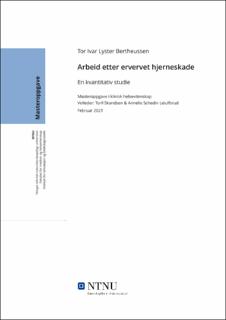| dc.contributor.advisor | Toril Skandsen | |
| dc.contributor.advisor | Annelie Schedin Leiulfsrud | |
| dc.contributor.author | Tor Ivar Lyster Bertheussen | |
| dc.date.accessioned | 2021-09-25T16:17:52Z | |
| dc.date.available | 2021-09-25T16:17:52Z | |
| dc.date.issued | 2021 | |
| dc.identifier | no.ntnu:inspera:65724388:73253567 | |
| dc.identifier.uri | https://hdl.handle.net/11250/2782719 | |
| dc.description.abstract | Formål og bakgrunn: Formålet med studien er å få mer kunnskap om arbeidsdeltakelse og opplevd nytte av tiltaket: Funksjonsvurdering med fokus på arbeid og utdanning blant personer med ervervet hjerneskade. Jeg ønsket å finne ut om dette tilbudet førte til deltakelse i arbeidslivet, og i et helhetlig perspektiv, hvilke hemmende og fremmende faktorer som kunne påvirke arbeidsdeltakelse. Økt kunnskap om arbeidsdeltakelse etter ervervet hjerneskade kan være med på å bidra til å styrke tilbudet Funksjonsvurdering med fokus på arbeid og utdanning, og sikre at flest mulig opplever at tilbudet er nyttig for å komme tilbake til arbeidslivet etter en ervervet hjerneskade.
Forskningsspørsmål:
I hvilken grad deltok informantene i arbeidslivet på oppfølgingstidspunktet?
Hvilke faktorer kan virke fremmende eller hemmende på arbeidsdeltakelse etter ervervet hjerneskade?
Hvilken betydning har arbeidsdeltakelse for tilfredshet med livet?
Hvor nyttig oppleves en tverrfaglig funksjonsvurdering for arbeidsdeltakelse?
Design og metode: Studien har et historisk prospektivt design med en oppfølging i form av et telefonintervju av personer med ervervet hjerneskade, 2-3 år etter at de hadde mottatt tilbudet Funksjonsvurdering med fokus på arbeid og utdanning. 27 personer mellom 26 og 69 år deltok i studien. Data ble analysert kvantitativt. Utfallsvariabel var arbeidsdeltakelse kategorisert som Høy arbeidsdeltakelse (≥50 %) og Lav arbeidsdeltakelse (<50 %). Andre studievariabler ble organisert etter Internasjonal klassifikasjon av funksjon, funksjonshemming og helse i kategoriene kroppsfunksjoner og strukturer, aktivitet, personlige faktorer og miljøfaktorer.
Resultater: Studien viser at arbeidsdeltakelsen på intervjutidspunktet var 70 %, og jeg fant at faktorer relatert til kroppsfunksjoner, personlige faktorer og miljøfaktorer påvirket arbeidsdeltakelsen til deltakerne. Fremmende faktorer for arbeidsdeltakelse var kjønn (kvinne), ha høy utdanning, å tillegge arbeid høy betydning, å komme tilbake til sin tidligere arbeidsgiver og oppleve støtte fra arbeidsgiver. Hemmende faktorer for arbeidsdeltakelse var høyere alvorlighet av skaden, og å ha en fysisk anstrengende jobb. De med Høy arbeidsdeltakelse var mer fornøyd med livet som helhet, yrkessituasjonen, det å klare seg selv og sin psykiske og kroppslige helse. Deltakerne var godt fornøyd med Funksjonsvurdering med fokus på arbeid og utdanning. Over halvparten mente at tilbudet var «veldig nyttig», og to tredeler var «veldig fornøyde» med hjelpen de har fått.
Konklusjon: Arbeidsdeltakelsen etter Funksjonsvurdering med fokus på arbeid og utdanning var høy. Faktorer relatert til kroppsfunksjoner og strukturer, personlige faktorer og miljøfaktorer påvirket arbeidsdeltakelse etter en ervervet hjerneskade. De med Høy arbeidsdeltakelse var mer tilfreds med ulike aspekter ved livet enn de med Lav arbeidsdeltakelse. De fleste var godt fornøyd med tilbudet, og vurderte det som nyttig for å komme tilbake til arbeidslivet. | |
| dc.description.abstract | Background: The purpose of the study is to gain more knowledge about work participation and perceived benefits of Functional assessment with a focus on work and education among people with acquired brain injury. I wanted to study whether this intervention led to participation in working life, and from a holistic perspective, which inhibiting and promoting factors could affect work participation. Increased knowledge about work participation after acquired brain injury can help to strengthen the intervention Functional assessment with a focus on work and education, and ensure that as many people as possible feel that the intervention is important for return-to-work after an acquired brain injury.
Research questions:
To what extent did the informants participate in working life at the time of follow-up?
Which facilitating and inhibiting factors exist for return-to-work after acquired brain injury?
How does work participation impact satisfaction with life?
How useful is an interdisciplinary evaluation of functional assessment for work participation?
Research design and methods: This study has a historical prospective design where a follow-up was carried out in the form of a telephone interview of people with acquired brain injury 2-3 years after they had received the intervention Functional assessment with a focus on work and education. 27 people between the ages of 26 to 69 participated in the study. Data were analyzed quantitatively. The outcome variable was work participation categorized as High work participation (≥50%) and Low work participation (<50%). Other study variables were organized according to the International Classification of Function, Disability and Health in the categories of body functions and structures, activity, personal factors and environmental factors.
Results: The study shows that the work participation at the time of the interview was 70%, and I found that factors related to body functions, personal factors and environmental factors affected the work participation of the participants. Promoting factors for work participation were gender (woman), having a high level of education, attaching high importance to work, returning to previous employer and experiencing support from the employer. Inhibiting factors for work participation were a high severity of the injury and having a physically strenuous job. Those with high work participation were more satisfied with life in general, the occupational situation, being able to manage themselves and their mental and physical health. The participants were very satisfied with the Functional assessment with a focus on work and education. More than half thought that the intervention had been “very useful”, and two thirds were “very satisfied” with the help they had received.
Conclusion: Work participation after Functional assessment with a focus on work and education was high. Factors related to body functions and structures, personal factors and environmental factors influenced work participation after an acquired brain injury. Those with High Work Participation were more satisfied with various aspects of life than those with Low Work Participation. A majority were satisfied with the intervention and considered it important for returning to working life. | |
| dc.language | nob | |
| dc.publisher | NTNU | |
| dc.title | Arbeid etter ervervet hjerneskade | |
| dc.type | Master thesis | |
